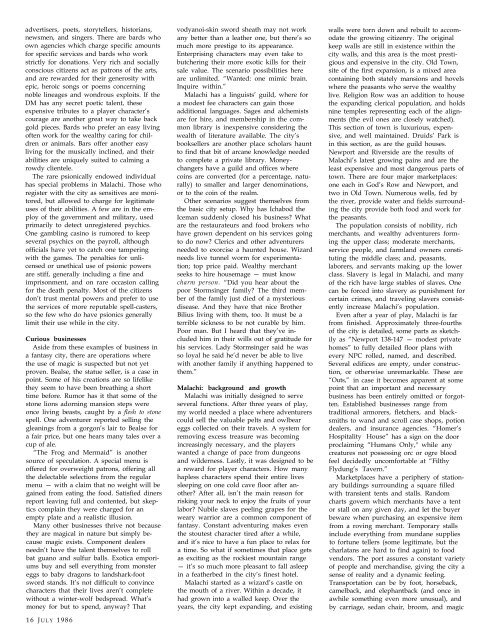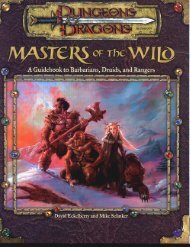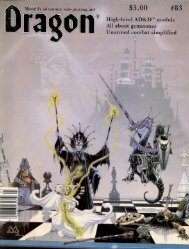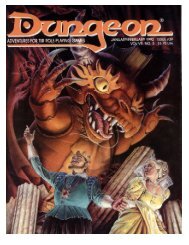Accessory - Dragon Magazine #111.pdf - Index of
Accessory - Dragon Magazine #111.pdf - Index of
Accessory - Dragon Magazine #111.pdf - Index of
You also want an ePaper? Increase the reach of your titles
YUMPU automatically turns print PDFs into web optimized ePapers that Google loves.
advertisers, poets, storytellers, historians,<br />
newsmen, and singers. There are bards who<br />
own agencies which charge specific amounts<br />
for specific services and bards who work<br />
strictly for donations. Very rich and socially<br />
conscious citizens act as patrons <strong>of</strong> the arts,<br />
and are rewarded for their generosity with<br />
epic, heroic songs or poems concerning<br />
noble lineages and wondrous exploits. If the<br />
DM has any secret poetic talent, these<br />
expensive tributes to a player character’s<br />
courage are another great way to take back<br />
gold pieces. Bards who prefer an easy living<br />
<strong>of</strong>ten work for the wealthy caring for children<br />
or animals. Bars <strong>of</strong>fer another easy<br />
living for the musically inclined, and their<br />
abilities are uniquely suited to calming a<br />
rowdy clientele.<br />
The rare psionically endowed individual<br />
has special problems in Malachi. Those who<br />
register with the city as sensitives are monitored,<br />
but allowed to charge for legitimate<br />
uses <strong>of</strong> their abilities. A few are in the employ<br />
<strong>of</strong> the government and military, used<br />
primarily to detect unregistered psychics.<br />
One gambling casino is rumored to keep<br />
several psychics on the payroll, although<br />
<strong>of</strong>ficials have yet to catch one tampering<br />
with the games. The penalties for unlicensed<br />
or unethical use <strong>of</strong> psionic powers<br />
are stiff, generally including a fine and<br />
imprisonment, and on rare occasion calling<br />
for the death penalty. Most <strong>of</strong> the citizens<br />
don’t trust mental powers and prefer to use<br />
the services <strong>of</strong> more reputable spell-casters,<br />
so the few who do have psionics generally<br />
limit their use while in the city.<br />
Curious businesses<br />
Aside from these examples <strong>of</strong> business in<br />
a fantasy city, there are operations where<br />
the use <strong>of</strong> magic is suspected but not yet<br />
proven. Bealse, the statue seller, is a case in<br />
point. Some <strong>of</strong> his creations are so lifelike<br />
they seem to have been breathing a short<br />
time before. Rumor has it that some <strong>of</strong> the<br />
stone lions adorning mansion steps were<br />
once living beasts, caught by a flesh to stone<br />
spell. One adventurer reported selling the<br />
gleanings from a gorgon’s lair to Bealse for<br />
a fair price, but one hears many tales over a<br />
cup <strong>of</strong> ale.<br />
“The Frog and Mermaid” is another<br />
source <strong>of</strong> speculation. A special menu is<br />
<strong>of</strong>fered for overweight patrons, <strong>of</strong>fering all<br />
the delectable selections from the regular<br />
menu — with a claim that no weight will be<br />
gained from eating the food. Satisfied diners<br />
report leaving full and contented, but skeptics<br />
complain they were charged for an<br />
empty plate and a realistic illusion.<br />
Many other businesses thrive not because<br />
they are magical in nature but simply because<br />
magic exists. Component dealers<br />
needn’t have the talent themselves to roll<br />
bat guano and sulfur balls. Exotica emporiums<br />
buy and sell everything from monster<br />
eggs to baby dragons to landshark-foot<br />
sword stands. It’s not difficult to convince<br />
characters that their lives aren’t complete<br />
without a winter-wolf bedspread. What’s<br />
money for but to spend, anyway? That<br />
16 JULY 1986<br />
vodyanoi-skin sword sheath may not work<br />
any better than a leather one, but there’s so<br />
much more prestige to its appearance.<br />
Enterprising characters may even take to<br />
butchering their more exotic kills for their<br />
sale value. The scenario possibilities here<br />
are unlimited. “Wanted: one mimic brain.<br />
Inquire within.”<br />
Malachi has a linguists’ guild, where for<br />
a modest fee characters can gain those<br />
additional languages. Sages and alchemists<br />
are for hire, and membership in the common<br />
library is inexpensive considering the<br />
wealth <strong>of</strong> literature available. The city’s<br />
booksellers are another place scholars haunt<br />
to find that bit <strong>of</strong> arcane knowledge needed<br />
to complete a private library. Moneychangers<br />
have a guild and <strong>of</strong>fices where<br />
coins are converted (for a percentage, naturally)<br />
to smaller and larger denominations,<br />
or to the coin <strong>of</strong> the realm.<br />
Other scenarios suggest themselves from<br />
the basic city setup. Why has Ichabod the<br />
Iceman suddenly closed his business? What<br />
are the restaurateurs and food brokers who<br />
have grown dependent on his services going<br />
to do now? Clerics and other adventurers<br />
needed to exorcise a haunted house. Wizard<br />
needs live tunnel worm for experimentation;<br />
top price paid. Wealthy merchant<br />
seeks to hire housemage — must know<br />
charm person. “Did you hear about the<br />
poor Stormsinger family? The third member<br />
<strong>of</strong> the family just died <strong>of</strong> a mysterious<br />
disease. And they have that nice Brother<br />
Bilius living with them, too. It must be a<br />
terrible sickness to be not curable by him.<br />
Poor man. But I heard that they’ve included<br />
him in their wills out <strong>of</strong> gratitude for<br />
his services. Lady Stormsinger said he was<br />
so loyal he said he’d never be able to live<br />
with another family if anything happened to<br />
them.”<br />
Malachi: background and growth<br />
Malachi was initially designed to serve<br />
several functions. After three years <strong>of</strong> play,<br />
my world needed a place where adventurers<br />
could sell the valuable pelts and owlbear<br />
eggs collected on their travels. A system for<br />
removing excess treasure was becoming<br />
increasingly necessary, and the players<br />
wanted a change <strong>of</strong> pace from dungeons<br />
and wilderness. Lastly, it was designed to be<br />
a reward for player characters. How many<br />
hapless characters spend their entire lives<br />
sleeping on one cold cave floor after another?<br />
After all, isn’t the main reason for<br />
risking your neck to enjoy the fruits <strong>of</strong> your<br />
labor? Nubile slaves peeling grapes for the<br />
weary warrior are a common component <strong>of</strong><br />
fantasy. Constant adventuring makes even<br />
the stoutest character tired after a while,<br />
and it’s nice to have a fun place to relax for<br />
a time. So what if sometimes that place gets<br />
as exciting as the rockiest mountain range<br />
— it’s so much more pleasant to fall asleep<br />
in a featherbed in the city’s finest hotel.<br />
Malachi started as a wizard’s castle on<br />
the mouth <strong>of</strong> a river. Within a decade, it<br />
had grown into a walled keep. Over the<br />
years, the city kept expanding, and existing<br />
walls were torn down and rebuilt to accomodate<br />
the growing citizenry. The original<br />
keep walls are still in existence within the<br />
city walls, and this area is the most prestigious<br />
and expensive in the city. Old Town,<br />
site <strong>of</strong> the first expansion, is a mixed area<br />
containing both stately mansions and hovels<br />
where the peasants who serve the wealthy<br />
live. Religion Row was an addition to house<br />
the expanding clerical population, and holds<br />
nine temples representing each <strong>of</strong> the alignments<br />
(the evil ones are closely watched).<br />
This section <strong>of</strong> town is luxurious, expensive,<br />
and well maintained. Druids’ Park is<br />
in this section, as are the guild houses.<br />
Newport and Riverside are the results <strong>of</strong><br />
Malachi’s latest growing pains and are the<br />
least expensive and most dangerous parts <strong>of</strong><br />
town. There are four major marketplaces:<br />
one each in God’s Row and Newport, and<br />
two in Old Town. Numerous wells, fed by<br />
the river, provide water and fields surrounding<br />
the city provide both food and work for<br />
the peasants.<br />
The population consists <strong>of</strong> nobility, rich<br />
merchants, and wealthy adventurers forming<br />
the upper class; moderate merchants,<br />
service people, and farmland owners constituting<br />
the middle class; and, peasants,<br />
laborers, and servants making up the lower<br />
class. Slavery is legal in Malachi, and many<br />
<strong>of</strong> the rich have large stables <strong>of</strong> slaves. One<br />
can be forced into slavery as punishment for<br />
certain crimes, and traveling slavers consistently<br />
increase Malachi’s population.<br />
Even after a year <strong>of</strong> play, Malachi is far<br />
from finished. Approximately three-fourths<br />
<strong>of</strong> the city is detailed, some parts as sketchily<br />
as “Newport 138-147 — modest private<br />
homes” to fully detailed floor plans with<br />
every NPC rolled, named, and described.<br />
Several edifices are empty, under construction,<br />
or otherwise unremarkable. These are<br />
“Outs,” in case it becomes apparent at some<br />
point that an important and necessary<br />
business has been entirely omitted or forgotten.<br />
Established businesses range from<br />
traditional armorers, fletchers, and blacksmiths<br />
to wand and scroll case shops, potion<br />
dealers, and insurance agencies. “Homer’s<br />
Hospitality House” has a sign on the door<br />
proclaiming “Humans Only," while any<br />
creatures not possessing orc or ogre blood<br />
feel decidedly uncomfortable at “Filthy<br />
Flydung’s Tavern.”<br />
Marketplaces have a periphery <strong>of</strong> stationary<br />
buildings surrounding a square filled<br />
with transient tents and stalls. Random<br />
charts govern which merchants have a tent<br />
or stall on any given day, and let the buyer<br />
beware when purchasing an expensive item<br />
from a roving merchant. Temporary stalls<br />
include everything from mundane supplies<br />
to fortune tellers (some legitimate, but the<br />
charlatans are hard to find again) to food<br />
vendors. The port assures a constant variety<br />
<strong>of</strong> people and merchandise, giving the city a<br />
sense <strong>of</strong> reality and a dynamic feeling.<br />
Transportation can be by foot, horseback,<br />
camelback, and elephantback (and once in<br />
awhile something even more unusual), and<br />
by carriage, sedan chair, broom, and magic







